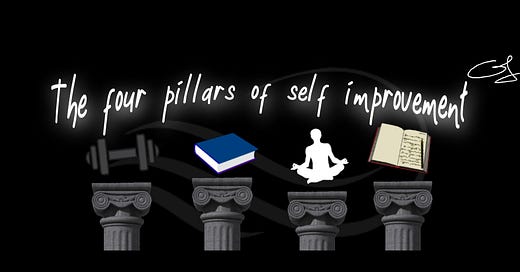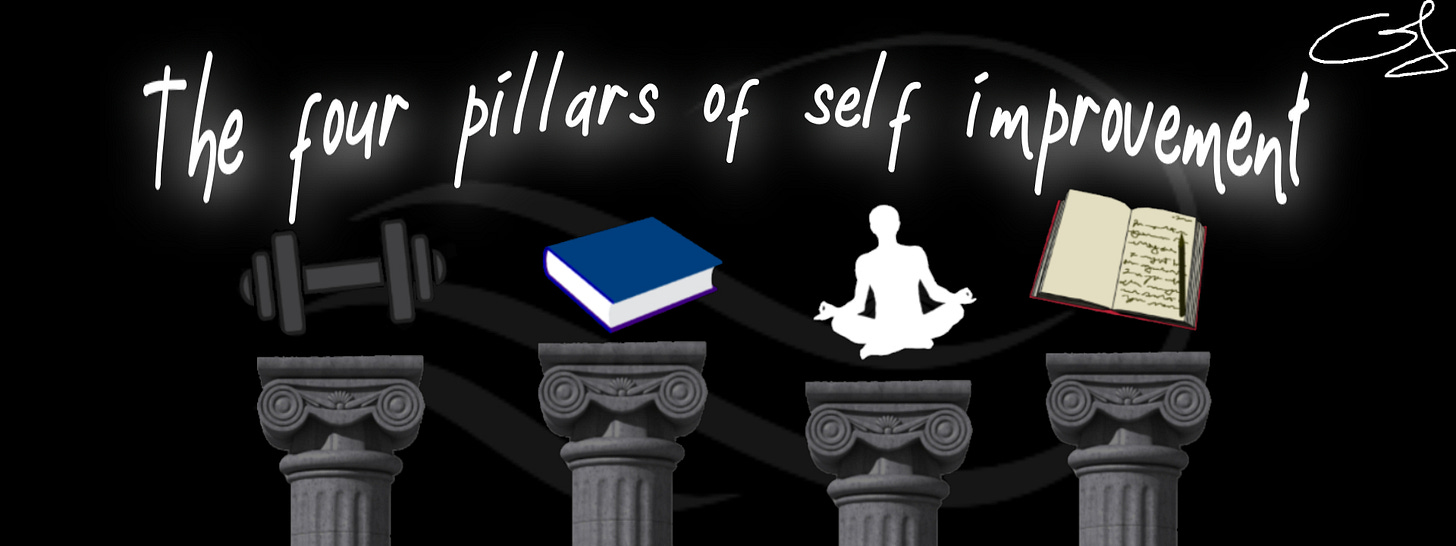Self improvement is a rather weird concept - or maybe just unknown - but it doesn’t fall short of being unique. Self improvement is a mindset - one based around integrity and hope - and most individuals go their whole lives without fully acknowledging, let alone understanding and adopting this concept.
When you begin to analyze its importance, you quickly realize that it has numerous benefits that arise primarily from the four most crucial yet basic habits of self improvement.
The first pillar: Exercising
The first habit and arguably the most well-known and appreciated activity of this kind in our society is working out. Every mentally sane individual would wholeheartedly agree that being in great physical condition is a great asset to have.
Sometimes this can be an indication of a person’s self-discipline and level of mental strength. Exercising daily increases confidence and determination, because you are constantly pushing yourself even if your mind might sometimes object to this intensity of responsibility and effort.
Having a strong body means having a strong mind, which means that your ability to control the outcomes of your existence increases exponentially and significantly over time. Simply acquiring the confidence and the knowledge that you are in fact capable of great things will carry out as a crucial benefit to the rest of your endeavors.
The second pillar: Reading
Now, reading is also a commonly found habit of mainly introverted people - or at least that’s the general assessment. You’ve heard all of the commonly spread benefits like improving your vocabulary and creativity, but there are higher levels of profit when it comes to the consumption of literature as your main form of content.
In the past, when knowledge was not so accessible as it is nowadays, the wise elderly man in every tribe would have to pass on his lessons and basic understandings of concepts to the younger generations in order for the tribe to thrive and evolve. This is precisely why books were initially invented, as a form of assuring the education of the youth without being forced to rely on mere human remembrance.
Latterly, the appearance of the education system basically condensed the knowledge from books into neatly organized lectures - with the drawback of familiarizing an investment lasting for well over a decade in one’s future with no guarantee of success.
For that reason specifically, you should read books, because they contain the true and unfiltered information; they contain true knowledge, without the unnecessary indoctrination and extreme waste of time.
The third pillar: Meditating
The habit of meditation, while being an unfamiliar concept to many people, does not fall short of providing great results in the improvement of mental health, gratitude, and the depth of your thoughts.
In our modern society, it is nearly impossible to avoid the extreme attempts at captivating and essentially stealing our attention - which is the most important thing that you possess. Any activity that obtains our undivided attention can quickly become our most valued form of fulfillment, but also our worst nightmare - in the case that we are not cautious enough.
It is one of the most basic forms of improving your productivity, through making you more mindful and present. Thus, the existence of procrastination becomes solely a result of not being completely focused on one thing that you are trying to achieve.
One more thing that should encourage you to start meditating is the realization that you cannot even hold a proper conversation. Your brain is unable to communicate as it is physiologically intended because your mind is not completely present. Sometimes people do not fully exit these spaces meant for escapism (e.g. the internet) and unconsciously continue to use terminology directly associated with those spaces even in real life. That is problematic.
The fourth pillar: Journaling
A lot of people live life in a way that is not entirely focused on their future or development in any way, especially because many of them have not yet assessed and sorted out their past. Writing out your experiences - not just your thoughts - is a great way of acquiring closure maybe on a topic that would otherwise be left unsupervised somewhere in the depths of your mind to haunt you forever.
This practice is objectively more effective when it is done on paper, with a pen. This might develop your relationship with the real world since you can unplug from all of the technology around you, considering that you have to focus on a real activity, with elements that are in the physical realm, rather than in the digital world.
A very popular form of journaling is that which is called: “gratitude journaling”. This makes you appreciate what you have, instead of constantly being in a state of disgust for the deck of cards that was dealt to you. It makes you appreciate things, not in a way that makes you content, but in a wholesome manner, where you actually get to see the beauty of the world instead of living like an addicted nihilist.
Conclusion:
Exercising - It’s healthy and it builds merited confidence.
Reading - It gives you real knowledge.
Meditating - It develops your mindfulness and makes you present.
Journaling - it helps you set your past to order and makes you more grateful.
If everything you have read so far made sense to you, I believe it would be of interest for you to subscribe to my page so you can support me in developing your curiosity but also your critical thinking skills:
Furthermore you can share this post and comment in order to keep the discussion going:













